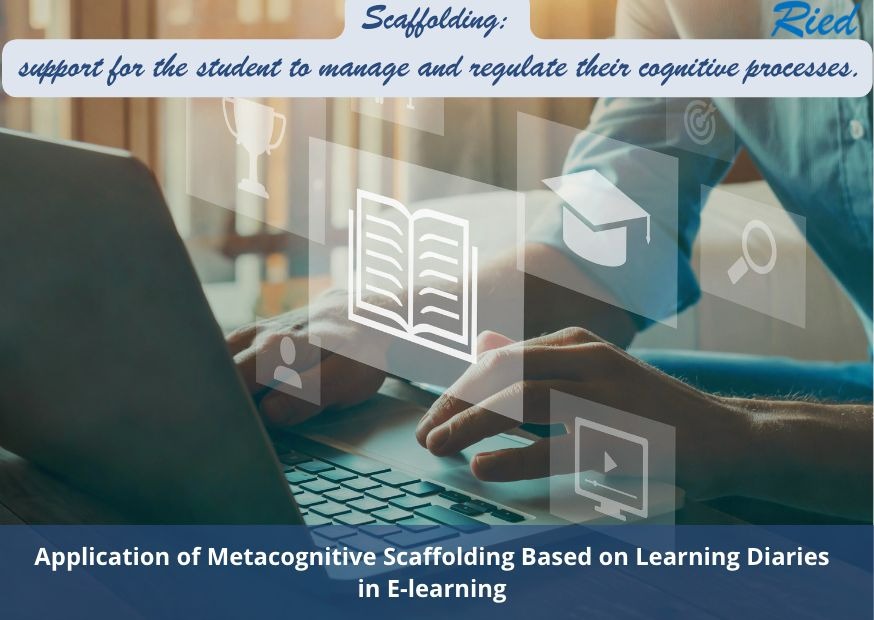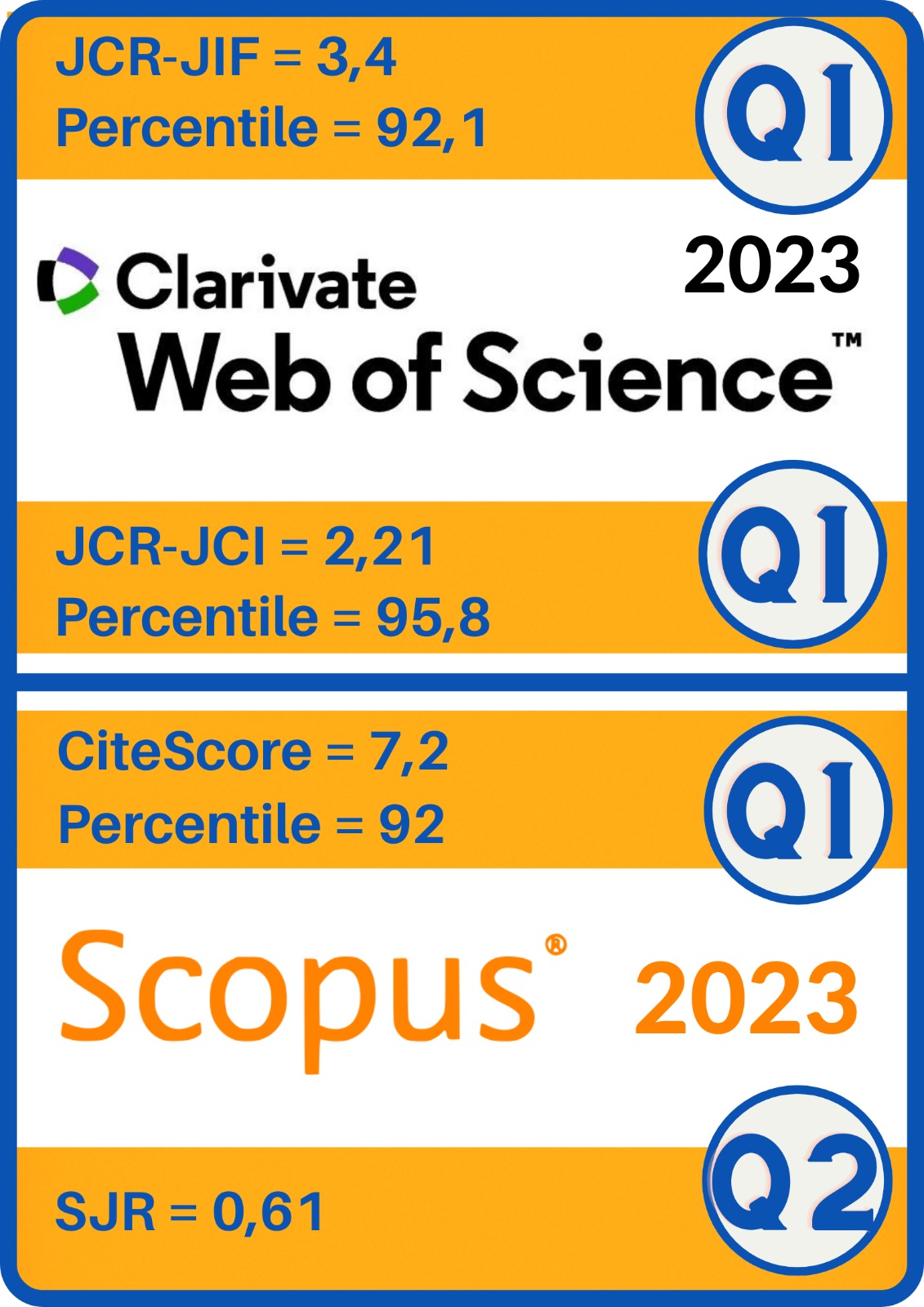Application of Metacognitive Scaffolding Based on Learning Diaries in E-learning
DOI:
https://doi.org/10.5944/ried.26.2.36252Keywords:
metacognitive scaffolding, self-regulation, e-learning, learning diariesAbstract
The present research addresses the study of the impact of the use of metacognitive scaffolding on learning outcomes and participation in university students who study online. Based on a mixed research approach, the design of a metacognitive scaffolding based on a learning diary oriented to continuous reflection and its application in an experimental group is addressed. Through content analysis of the student’s reflections, the most important factors in the process of self-regulation are identified. Furthermore, the grades and participation of the students and the monitoring of their work on the digital platform are compared with a control group, with the aim of analyzing the impact of scaffolding on their results. From this experience, it is concluded that the application of metacognitive scaffolding as a self-regulation strategy has a significant impact in favor of the students during the development and monitoring of the subject, showing a higher level of involvement in the activities and use of digital tools. However, no significant differences were found in the results of the exams and the use of communication tools on the platform. In conclusion, the application of scaffolding can help to generate a more homogeneous overall learning experience among learners in the same group and, in turn, improve the results related to learning by doing.
FULL ARTICLE:
https://revistas.uned.es/index.php/ried/article/view/36252/27666
Downloads
References
Alonso, C., Gallego, D., y Honey, P. (1999). Los estilos de aprendizaje: procedimientos de diagnóstico y mejora. Mensajero.
Azevedo, R. (2005). Using Hypermedia as a Metacognitive Tool for Enhancing Student Learning? The Role of Self-regulated Learning. Educational Psychologist, 40(4), 199-209. https://doi.org/10.1207/s15326985ep4004_2
Bates, T. (2009). ¿Se comprende realmente lo que es el e-learning? En A. Gewerc Barujel (Coord.), Políticas, prácticas e investigación en tecnología educativa (pp. 109-132). Octaedro.
Berridi-Ramírez, R., y Martínez-Guerrero, J. I. (2017). Estrategias de autorregulación en contextos virtuales de aprendizaje. Perfiles educativos, 39(156), 89-102. https://doi.org/10.22201/iisue.24486167e.2017.156.58285
Bort-Mir, L. (2016). Desarrollando la Herramienta DAG: Diario de Aprendizaje Guiado para Promover y Evaluar los Procesos Metacognitivos de los Estudiantes en la Educación Superior. En A. M. Arnal Pons, J. J. Castelló Benavent, I. Epifanio López, C. Galindo Pastor, P. Gregori Huerta, A. M. Lluch Peris, y V. Martínez García (Coords.), Actas del Congreso virtual Avances en Tecnología, Innovación y Desafíos de la Educación Superior, (pp. 421-434). Universitat Jaume I. https://doi.org/10.6035/InnovacioEducativa.2016.16
Bort-Mir, L. (2021). Using PenzuTM for Academic Online Diaries to Enhance Metacognitive Skills in Higher Education. The EuroCALL Review, 28(2), 50-63. https://doi.org/10.4995/eurocall.2020.12756
Draeger, J., y Winckelmann, B. (2020). How Metacognitive Instructors Can Use Their Learning Management System to Facilitate Student Learning. Journal of Teaching and Learning With Technology, 9(1). https://doi.org/10.14434/jotlt.v9i1.29159
Garofalo, S. J., y Miño, M. H. (2021). Estrategias evaluativas para promover la autorregulación del aprendizaje de Biología en estudiantes de primer año universitario. Ciência & Educação, (27), 1-19. https://doi.org/10.1590/1516-731320210053
Greene, J. A., Moos, D. C., y Azevedo, R. (2011). Self-regulation of learning with computer-based learning environments. New Directions for Teaching and Learning, 126(2011), 107-115. https://doi.org/10.1002/tl.449
Gros, B. (2011). Evolución y retos de la educación virtual. Construyendo el e-learning del siglo XXI. UOC.
Gros, B., y Cano, E. (2021). Procesos de feedback para fomentar la autorregulación con soporte tecnológico en la educación superior: Revisión sistemática. RIED-Revista Iberoamericana de Educación a Distancia, 24(2), 107-125. https://doi.org/10.5944/ried.24.2.28886
Hederich, C., Camargo, Á., y López, O. (2015). Amadis: Un andamiaje para el desarrollo de la autorregulación en la educación virtual. Presentación y manual para el desarrollo de cursos en Tutor. Universidad Pedagógica de Colombia.
Hernández-Rivero, V. M., Santana-Bonilla, P. J., y Sosa-Alonso, J. J. (2021). Feedback y autorregulación del aprendizaje en educación superior. Revista de Investigación Educativa, 39(1), 227-248. https://doi.org/10.6018/rie.423341
Jaramillo, L., y Simbaña, V. (2014). La metacognición y su aplicación en herramientas virtuales desde la práctica docente. Sophia: colección de filosofía de la educación, 16(1), 299-313.
Lehmann, T., Hähnlein, I., y Ifenthaler, D. (2014). Cognitive, metacognitive and motivational perspectives on preflection in self-regulated online learning. Computers in Human Behavior, 32, 313-323. https://doi.org/10.1016/j.chb.2013.07.051
Lluch, L., Pons, L., y Cano, E. (2020). La evaluación entre iguales para contribuir al desarrollo de la competencia de aprender a aprender en el grado de maestro de educación primaria. En R. Roig-Vila (Coord.), Redes de Investigación en Docencia Universitaria (pp. 273-284). ICE de la Universidad de Alicante.
López-Vargas, O., Sanabria, L. B., y Buitrago-González, N. (2018). Efecto diferencial de un andamiaje metacognitivo sobre la autorregulación y el logro de aprendizaje en un ambiente combinado. Tecné, Episteme y Didaxis: TED, 44, 33-50. https://doi.org/10.17227/ted.num44-8988
Onwuegbuzie, A. J., Leech, N. L., Dickinson, W. B., y Zoran, A. G. (2011). Un marco cualitativo para la recolección y análisis de datos en la investigación basada en grupos focales. Paradigmas: una revista disciplinar de investigación, 3(2), 127-157. https://doi.org/10.1177/160940690900800301
Requena, M. A. (2020). Autorregulación del aprendizaje y su andamiaje en entornos virtuales. En L. Bengochea, D. Meziat y Ó. López, Actas del XIII Congreso Iberoamericano de Computación para el Desarrollo (pp. 75-84). Universidad de San Carlos de Guatemala. http://www.compdes.org/libros/compdes2020.pdf
Richardson, J. C., Caskurlu, S., Castellanos-Reyes, D., Duan, S., Duha, M. S. U., Fiock, H., y Long, Y. (2022). Instructors’ Conceptualization and Implementation of Scaffolding in Online Higher Education Courses. Journal of Computing in Higher Education, 34(1), 242-279. https://doi.org/10.1007/s12528-021-09300-3
Solórzano-Restrepo, J., y López-Vargas, O. (2019). Efecto diferencial de un andamiaje metacognitivo en un ambiente e-learning sobre la carga cognitiva, el logro de aprendizaje y la habilidad metacognitiva. Suma Psicológica, 26(1), 37-45. https://doi.org/10.14349/sumapsi.2019.v26.n1.5
Van Laer, S., y Elen, J. (2017). In search of attributes that support self-regulation in blended learning environments. Educational and Information Technologies, 22, 1395-1454. https://doi.org/10.1007/s10639-016-9505-x
Villalonga-Gómez, C., Ibáñez-Ibáñez, P., y Marta-Lazo, C. (2021). La educación digital en el ámbito universitario. Un enfoque 360. Aranzadi/Civitas.
Villalonga-Gómez, C., Ibáñez-Ibáñez, P., y Delgado-Reverón, L. (2021). Análisis del sistema de acompañamiento tecno-pedagógico al alumnado y profesorado en escenarios virtuales e híbridos. En C. Villalonga-Gómez, P. Ibáñez-Ibáñez, y C. Marta-Lazo, (Coord.), La educación digital en el ámbito universitario. Un enfoque 360, (pp. 73-97). Aranzadi/Civitas. https://doi.org/10.32029/2605-4655.03.02.2021
Villalonga-Gómez, C., y Mora-Cantallops, M. (2021). Profiling distance learners in TEL environments: a hierarchical cluster analysis. Behaviour & Information Technology, 41(7), 1439-1452. https://doi.org/10.1080/0144929X.2021.1876766
Winne, P. H. (2001). Self-regulated learning viewed from models of information processing. En B. J. Zimmerman y D. H. Schunk (Eds.), Self-regulated learning and academic achievement: Theoretical perspectives (pp. 153–189). Lawrence Erlbaum Associates Publishers.
Wood, D., Bruner, J. S., y Ross, G. (1976). The role of tutoring in problem solving. Child Psychology & Psychiatry & Allied Disciplines, 17(2), 89–100. https://doi.org/10.1111/j.1469-7610.1976.tb00381.x
Zimmerman, B. J. (2000). Attaining self-regulation. A social cognitive perspectives. En M. Boekaerts, P. R. Pintrich y M. Zeidner (Eds.), Handbook of self-regulation (pp. 13-39). Academic Press. https://doi.org/10.1016/B978-012109890-2/50031-7
Zimmerman, B. J. (2002). Becoming a self–regulated learner: an overview. Theory into Practice, 41, (2), 64-70. https://doi.org/10.1207/s15430421tip4102_2









